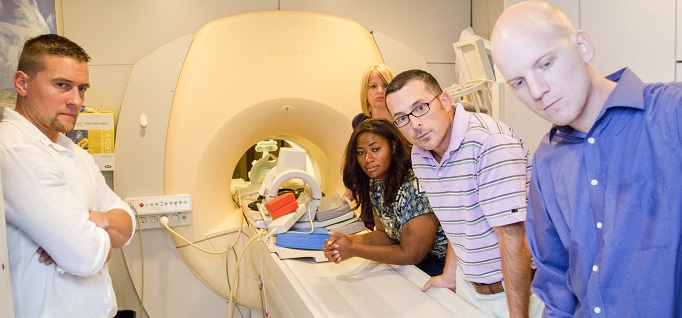Colleges team up to train MRI techs
By Ellie Ashford
April 5, 2017
Michigan’s community colleges are sharing courses and students to offer a high-cost MRI program.
Community colleges – especially colleges that are small or in rural areas – often lack the enrollment to justify offering high-cost programs. The Michigan Community College Association (MCCA) is addressing that problem through collaboration.
Under MCCA’s Collaborative Program Initiative, five community colleges and a university are jointly offering an online program for magnetic resonance imaging (MRI) technologists. Representatives from MCCA will highlight the initiative at a session during the annual convention of the American Association of Community Colleges in New Orleans April 22-25.
The program, which started five years ago, is an outgrowth of Michigan Colleges Online (MCO), a service developed by MCCA in 1991 that enables community colleges to share courses and students, says MCO Executive Director Ronda Edwards.
When a course at their home college is full or not offered in the summer, students can take the course online from another community college through MCO. Many university students also take advantage of MCO to get a jump start on college credits.
The participants in the MRI collaboration are Kellogg Community College, Grand Rapids Community College, Lake Michigan Community College, Lansing Community College, Mid-Michigan Community College and Grand Valley State University.
The cost dilemma
MRI technologists perform a scanning exam on patients, using physics and the characteristics of the patient’s body to get the best image possible for a radiologist to read, says Amy Lee, who used to head the MRI program at Kellogg and still teaches there. She also leads the MRI collaborative program at MCCA.
When Kellogg was thinking about establishing an MRI program, it found the cost would be in the millions, Lee says. Even if a college wants to use MRI scanners at a hospital, it would have to provide one-on-one support.
Without collaborating, the colleges wouldn’t be able to offer an MRI program, Edwards adds. There’s not only a high cost for equipment and faculty, there are few options for clinical experiences in rural areas. Some colleges are in regions with only one hospital – or none at all.
There aren’t that many job opportunities for MRI technologists in a community. Each community college only serves two or three counties, so they wouldn’t want to enroll too many students in an MRI program, as the market would be saturated.
Each college participating in the collaborative is limited to five students, for a total of 30. Students have to apply for the program separately and pass an interview process.
“By collaborating, they could reach more students, while meeting the community’s and state’s needs,” Edwards says.
How it works
The coursework is done online, while the clinicals are done at a medical facility within the home college’s region. Students who graduate get a degree from their home college.
The colleges jointly developed and share the curriculum. Students register through MCO and pay tuition through MCO to one of the three provider colleges: Kellogg, Lake Michigan and Lansing.
Michigan’s 28 community colleges each set their own tuition. MCO charges a single, slightly higher rate.
Tuition paid by students in the MRI program is shared among the participating colleges. Seventy percent is retained by a provider college, 20 percent goes to the student’s home college, and 10 percent goes to MCO.
Students who complete the program and want to continue their education can transfer to Grand Valley State University to pursue a bachelor of science degree in imaging science.
Northern Michigan University is expected to join the collaborative in 2018.
The program is on its sixth cohort, Lee says. So far, about 130 students have completed the program, and about a quarter of them are working on a bachelor’s degree.
There’s more to the story. Read the full article in CC Daily. Then discuss it at LinkedIn.


